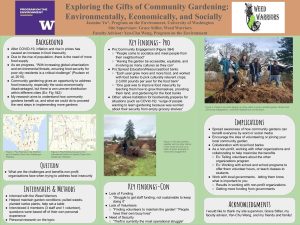Exploring the Gifts of Community Gardening: Environmentally, Economically, and Socially
People experiencing food insecurity will constantly grow if no attention is brought to the subject, especially with today’s inflation rates, along with the low minimum wages families are receiving. This brings us to look into community gardens, as it not only gives us an opportunity to help relieve the problem of food insecurity that socio-economically disadvantaged families experience, but it brings more attention to community gardens in general. If actually looking into community gardens, we can see that it brings much more that we expect in the field of: environmental, economical, and social. Bringing me to understand the importance of community gardens, I had the opportunity to work in the New Start Community Garden in Burien. Besides helping out with improving the conditions of the garden, I was able to take a deep dive in understanding the problems the garden ran into, but as well as the amazing outcomes it brought to the communities around through multiple interviews, both from the staff and volunteers there. The New Shark Community Garden was able to bring neighbors together, donate hundreds of pounds of food to the food bank, as well as provide educational lessons for free. Further, community gardens are able to increase biodiversity habitats, as well as prepare everyone for situations, such as during the pandemic of Covid-19. With the spread of awareness of what community gardens could bring to us, it allows the opportunities for more being implemented by spreading the message to local governments together.
